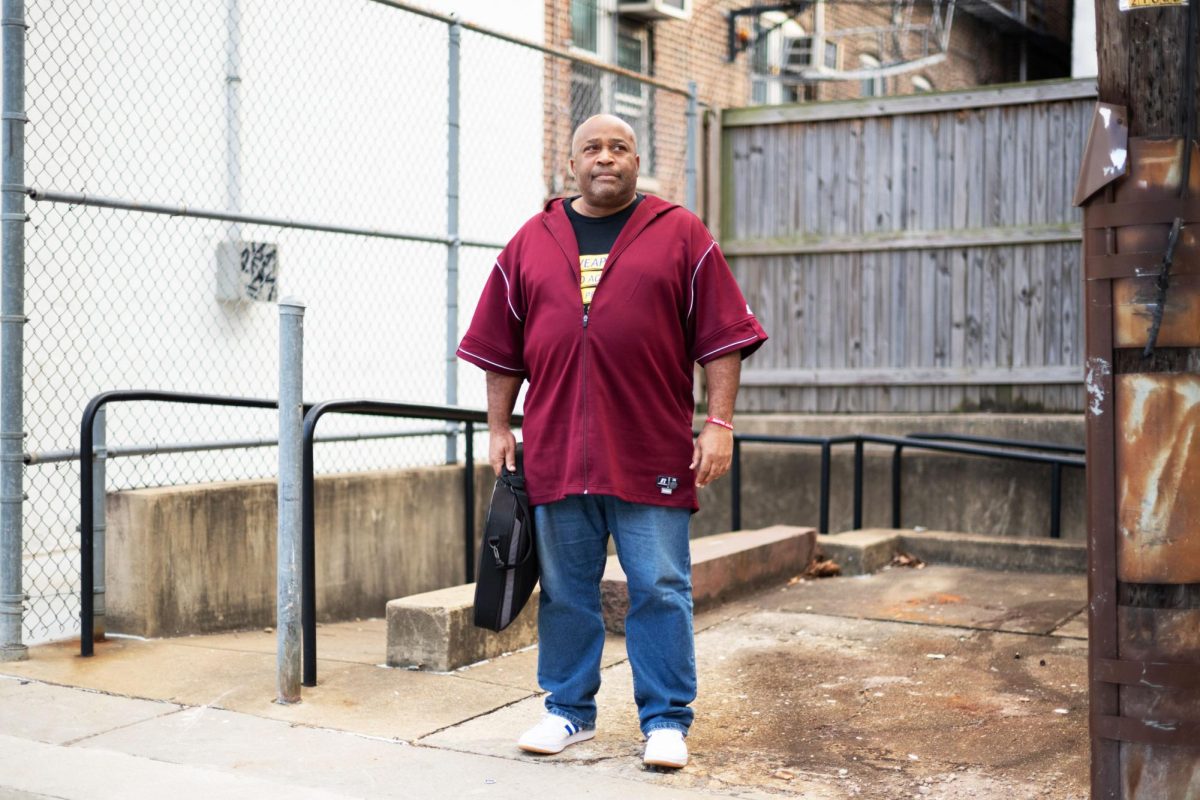Wesley Thomas said every morning he serves as an ambassador for people experiencing homelessness who are seeking connection to housing and disability support services.
Thomas is an advocate and outreach worker for people with lived experience of homelessness and a guest advisory board member at Miriam’s Kitchen, the nonprofit organization that served him his first meal of two hard-boiled eggs and Kool Aid on his second day of homelessness in 1988. Thomas, who lived on the streets of D.C. for 29 years before moving to an apartment in Woodley Park, said he’s connected 43 people to District housing and support resources since he moved off of the street.
“The first day I moved in, I said because of the blessing and the opportunity I was given, I was going to pay it forward and get back help those sleeping on the street,” Thomas said.
There are currently about 5,600 unhoused people in D.C., according to the Metropolitan Washington Council of Governments’ 2024 Point-In-Time homelessness tracker. Thomas said he recognizes about half of all the unhoused people in the District and distributes resources to as many people as he can.
Miriam’s outreach team distributes essential supplies — like blankets, hats, socks, gloves and water — to nearly half of D.C., according to the organization’s website.
Thomas said he uses his lived experience of homelessness to direct the people he serves to resources he used, like a program that offers unhoused people discounted glasses and phones.
He added that he also uses his experiences with anxiety, depression and bipolar disorder to inform his advocacy with unhoused populations and mental health. More than 30 percent of single adults experiencing homelessness in the District suffer from a mental illness, according to a 2018 Washington Legal Clinic for the Homeless report.
“Misfortunes in life, and I survived,” Thomas said. “So I got something to tell somebody.”
Thomas said his volunteer work and early mornings can be difficult to manage, but his daily routine provides him with the structure he needs.
“A lot of people say, ‘Well, you did 29 years, that’s hard,’” Thomas said. “No, the seven years that I’m doing now is a lot harder than that 29 years. I have to stay focused, I have to stay out of trouble and I have to have something to do, so that’s why I do what I do.”
He said he grew up in a middle class family in Northeast D.C. and fell into the “wrong crowd,” using drugs and alcohol before losing “everything.” He first slept across the street from the White House in Lafayette Square and relocated to Foggy Bottom in 1994.
“I was frightened, homeless, penniless, only clothing on my back,” Thomas said. “Didn’t know where I was going to sleep or eat.”
Thomas said a few other people experiencing homelessness at the time showed him where to eat, locations to sleep and how to survive the cold winters, he said. He said he had an “epiphany” in 2016 after multiple of his friends died while living on the streets and decided to “take his life back” and connect with housing support resources.
Thomas called his present-day appearances at Miriam’s Kitchen a “full circle” moment. The organization’s offerings are much different than the hard-boiled eggs and Kool Aid he once received — the cafeterias now have coffee machines, large containers of juice and breakfast foods ranging from quiche and pancakes to French toast, Thomas said.
“It’s like a relaxed atmosphere, you know,” Thomas said. “It’s a safe haven.”
At Miriam’s Kitchen, Thomas discusses his personal experience at conferences and to news outlets like the Washington Post and CNN’s “Homelessness in America” segment, led by Jake Tapper. The Hatchet profiled Thomas in 2010 when he was still experiencing homelessness.
Thomas also speaks on behalf of Miriam’s Kitchen at GW’s Acapella Palooza event during Alumni and Family Weekend each year.
He said advocates’s work to combat homelessness isn’t finished when people get into housing if formerly unhoused people can’t adapt from living on the street to the structure of supportive housing.
“You have to have someone to show them how to change their life,” Thomas said.
Thomas said he joined Miriam’s Speaker’s Bureau in 2023, a panel of seven people with lived experience of homelessness. He said the group worked on Miriam’s Kitchen strategic plan for the next five years — which outlines initiatives and values of the organization — and discusses topics like health, mental health and voter registration monthly.
Thomas said he also uses his experience of living on the street, surviving winters and navigating D.C.’s shelter system to offer feedback to the Community Advisory Team, which is a local group that oversees the conversion of The Aston, a former GW residence hall, to an unhoused shelter.
The shelter was originally slated to open more than 10 months ago, but most recently, a failed building inspection indefinitely delayed the building’s opening. At the team’s October meeting, members voiced concerns about the approaching hypothermia season — which runs Nov. 1 to March 31, depending on the severity of the weather — amid delays moving in the first 50 tenants, who were supposed to move in the week of Oct. 1.
Thomas said he is frustrated by the delays in the shelter’s opening, adding that moving into The Aston while final building construction is being completed is better than people sleeping on benches or on the street.
“They shouldn’t have to wait and die when they have an opportunity coming their way,” Thomas said.
He said he plans to voice his concerns about the impending hypothermia season and The Aston’s delays at the team’s next meeting on Nov. 4.
“Y’all holding it up,” Thomas said of District officials. “You got the money. You got everything else. Okay, you got people waiting to move in. Let’s just move the first 50 in. You know, you can work on the building while people in there.”





